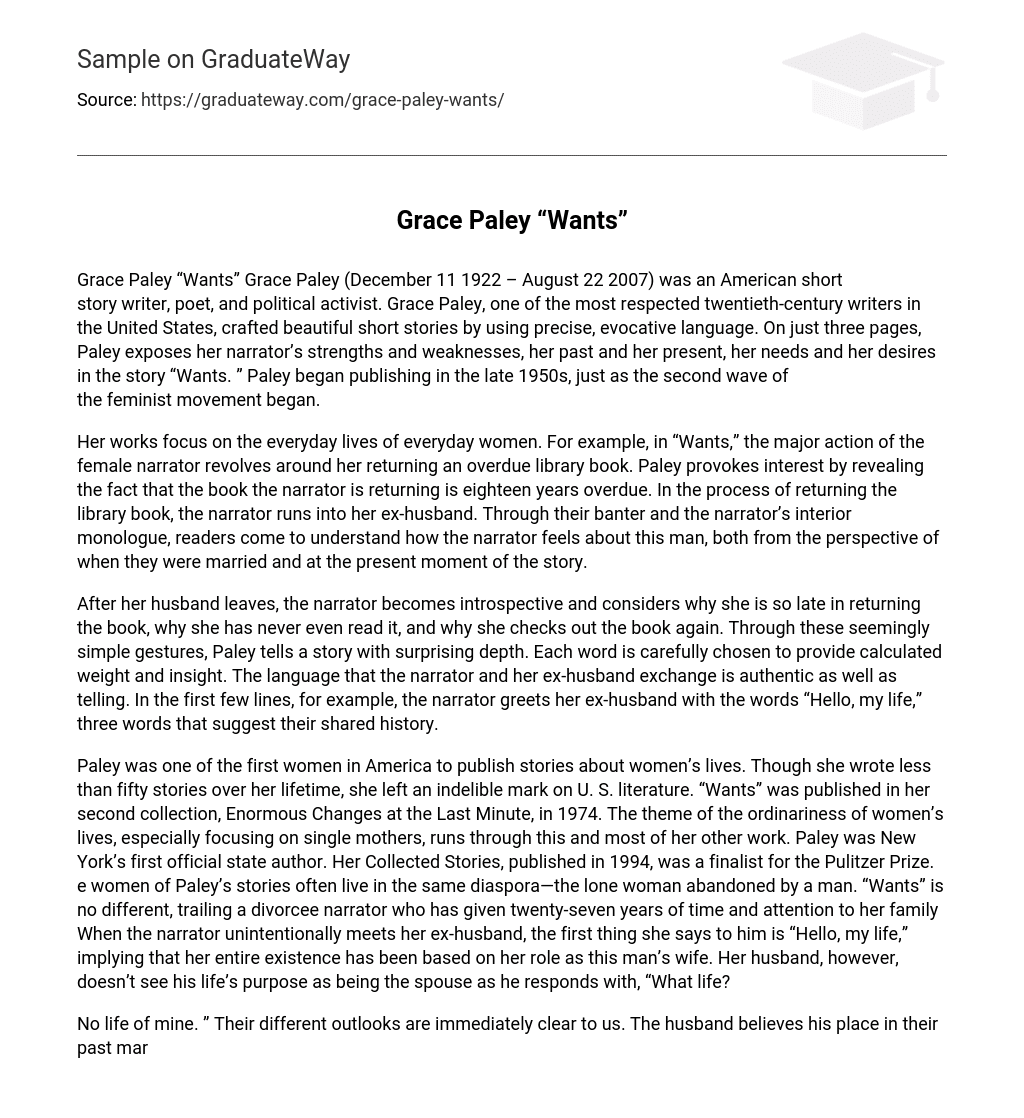Grace Paley (December 11 1922 – August 22 2007) was an American short story writer, poet, and political activist. Grace Paley, one of the most respected twentieth-century writers in the United States, crafted beautiful short stories by using precise, evocative language. On just three pages, Paley exposes her narrator’s strengths and weaknesses, her past and her present, her needs and her desires in the story “Wants. ” Paley began publishing in the late 1950s, just as the second wave of the feminist movement began.
Her works focus on the everyday lives of everyday women. For example, in “Wants,” the major action of the female narrator revolves around her returning an overdue library book. Paley provokes interest by revealing the fact that the book the narrator is returning is eighteen years overdue. In the process of returning the library book, the narrator runs into her ex-husband. Through their banter and the narrator’s interior monologue, readers come to understand how the narrator feels about this man, both from the perspective of when they were married and at the present moment of the story.
After her husband leaves, the narrator becomes introspective and considers why she is so late in returning the book, why she has never even read it, and why she checks out the book again. Through these seemingly simple gestures, Paley tells a story with surprising depth. Each word is carefully chosen to provide calculated weight and insight. The language that the narrator and her ex-husband exchange is authentic as well as telling. In the first few lines, for example, the narrator greets her ex-husband with the words “Hello, my life,” three words that suggest their shared history.
Paley was one of the first women in America to publish stories about women’s lives. Though she wrote less than fifty stories over her lifetime, she left an indelible mark on U. S. literature. “Wants” was published in her second collection, Enormous Changes at the Last Minute, in 1974. The theme of the ordinariness of women’s lives, especially focusing on single mothers, runs through this and most of her other work. Paley was New York’s first official state author. Her Collected Stories, published in 1994, was a finalist for the Pulitzer Prize. e women of Paley’s stories often live in the same diaspora—the lone woman abandoned by a man.
“Wants” is no different, trailing a divorcee narrator who has given twenty-seven years of time and attention to her family When the narrator unintentionally meets her ex-husband, the first thing she says to him is “Hello, my life,” implying that her entire existence has been based on her role as this man’s wife. Her husband, however, doesn’t see his life’s purpose as being the spouse as he responds with, “What life?
No life of mine. ” Their different outlooks are immediately clear to us. The husband believes his place in their past marriage hasn’t defined him the way it’s defined her. He blames her for their marriage coming to an end and she accepts the blame. After mentioning every logical reason that came between their marriage—children, war family illness—she tells him “But you’re right…You took adequate financial care” so that their children could look “just like everyone else.
They looked very nice. It’s only after her ex-husband mentions that she never “wanted anything” that she realizes her desires went beyond anything solid or materialistic that supposedly came with their marriage and family. Paley’s narrator sees change all around her—time passing by, a new building, a dead marriage, grown up children—but what she wants is a change in herself. “I wanted to have been married forever to one person. ” But that was then, and now after so many years, she wants “to be a different person. “Wants” is one of Paley’s most tamed pieces and it can be easily overlooked.
It’s very short, barely reaching to two pages. The language isn’t bold and catching as Paley’s other stories but it isn’t without substance. How many of us have wanted to do more in our lives? Wanted other things but were unable to get there because of the fences life built along the way? The meaning behind this story is universal and still has a kind significance in today’s society that makes it worth reading.





